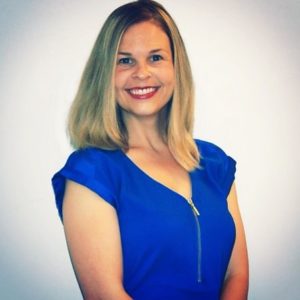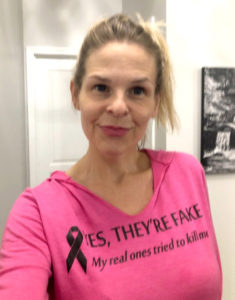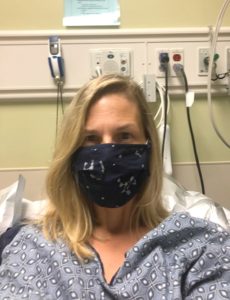
38-year-old Keri Stephens is a patient advocate, mother of two, and breast cancer previvor. After testing positive for the CHEK2 genetic mutation, Stephens’ learned her lifetime risk of developing breast cancer was 40-60%. She chose a prophylactic double mastectomy to reduce her risk of developing breast cancer significantly. Her goal now is to educate women about the importance of self-advocacy, genetic testing, and preventative care. Recently, Volpara spoke to Stephens about some of these important topics – read on to find out more.
If you could give people one piece of advice about their breast health, what would it be?
Be proactive. We all know that one in eight women will be diagnosed with breast cancer in their lifetime, but I think many people don’t know that there are steps they can take to reduce their risk. One of the great things about healthcare right now is the focus on preventative care instead of reactive treatment – women just aren’t informed about this.
Most women start getting mammograms at age 40, but many breast cancers strike earlier than 40 – so by the time you get screened, these cancers can be diagnosed at a very advanced stage with a much lower probability of survival. So, take proactive steps: know your family history, know your risk, get screening younger if you are high-risk, and get genetic testing.
What’s one thing you were surprised to learn about breast cancer?
When you think about breast cancer, you think about people in their 60s or 70s – your mom, your grandma. But I’ve gotten to know so many people younger than 40 – through my mastectomy group, my advocacy work. Breast cancer doesn’t care how old you are, so it’s important to understand your risk and feel empowered to work to minimize it.

How has your life changed because of breast cancer?
When I found out I had my genetic mutation, it changed my life in a lot of ways. I was 37 and it made me feel so vulnerable. I’d always felt so healthy – I work out, I eat right, I breastfed my son for 18 months and my daughter for one year. All of these things I knew reduced my risk of breast cancer, so even when I’d hear stories from my friends about people they knew developing breast cancer, I never felt like it would affect me.
But I can’t change my genes. They affect my family and my children too. I have a seven-year-old daughter – she has a 50% chance of sharing my genetic mutation. In this way, breast cancer feels so personal, even though I wasn’t diagnosed with it. Being a previvor is weird – I can’t completely empathize with someone who has experienced breast cancer but I did have a double mastectomy and I see the scars every time I look in the mirror. It’s affected many of the women in my family, and the fact that it could affect my daughter too is scary.
It’s empowering to know about the risk and the possible courses of action, like my double mastectomy, and to be able to share these tips with others.
What do you hope will change about patient education in the next five years?
I would love for every OBGYN to talk to their patients about their individual breast cancer risk. It should be part of every conversation each time a woman goes to the doctor’s office starting in their 20s, or even their teens. It’s also important for doctors to recommend genetic testing for people who were adopted because they might not know their family history. This sort of attention to detail is missing right now.
My situation was almost overlooked – the only reason my OB recommended genetic testing was because I was going through other issues and receiving a hysterectomy. I’d had so many visits before then where I’d mentioned that my aunt was diagnosed with breast cancer in her 40s and there was never any discussion about genetic testing. People need to know their genetics and their risk in order to make the best choices for themselves.
What’s one thing everyone should ask their doctor about their breast health?
Family history and risk reduction. Breast cancer has its own month – it’s so in-your-face and there’s so much effort to build awareness, but what has changed with all the money that’s gone into it? What’s the point of awareness if you don’t take steps to change things.
Instead of wearing pink, let’s talk to women about reducing their risk and how to talk to their doctors about these issues. Let’s also normalize preventative double mastectomies, getting mammograms before you’re 40, and looking into your family history. I went in for a colonoscopy and the doctor was like, “wow, you got a preventative double mastectomy – was your husband okay with that?” Everyone says it was such a drastic step to take but getting breast cancer is drastic.

What would you say to someone considering getting genetic testing?
It’s just a blood test. Maybe you have to pay a little bit out of pocket, but it’s something that could save your life or your children’s life, and something that has implications for the rest of your family too.
Don’t be afraid – knowledge is power and we’re lucky to be alive in a time when we can be preventative about our healthcare. Encourage everyone you know to get tested.
What could physicians do to encourage more women to get genetic testing?
I think they need to really take their time with patients – really ask about and look into their family history, ask if they have any first-degree relatives with breast cancer, or even aunts or grandparents.
Genetic cancers tend to strike younger so doctors need to pay attention to young patients. Patients have to advocate for themselves too, but physicians need to be informed about genetic testing options and encourage their patients to get tested.
What would you say to someone who might feel overwhelmed about all of this?
I just want women to feel empowered. Getting genetic testing and knowing your breast density and risk score can seem scary, but a cancer diagnosis is even scarier. So don’t be afraid of knowing your risk, and if you are high-risk, of taking steps like a double mastectomy. Obviously, I didn’t choose my story, but it was empowering because I got to choose on my own terms what I do. I didn’t have to wait for cancer – I made my own choice. And God forbid were I to get breast cancer in the future, I know I’ve done everything in my power to prevent it.
Photos courtesy of Keri Stephens and Today.com.
